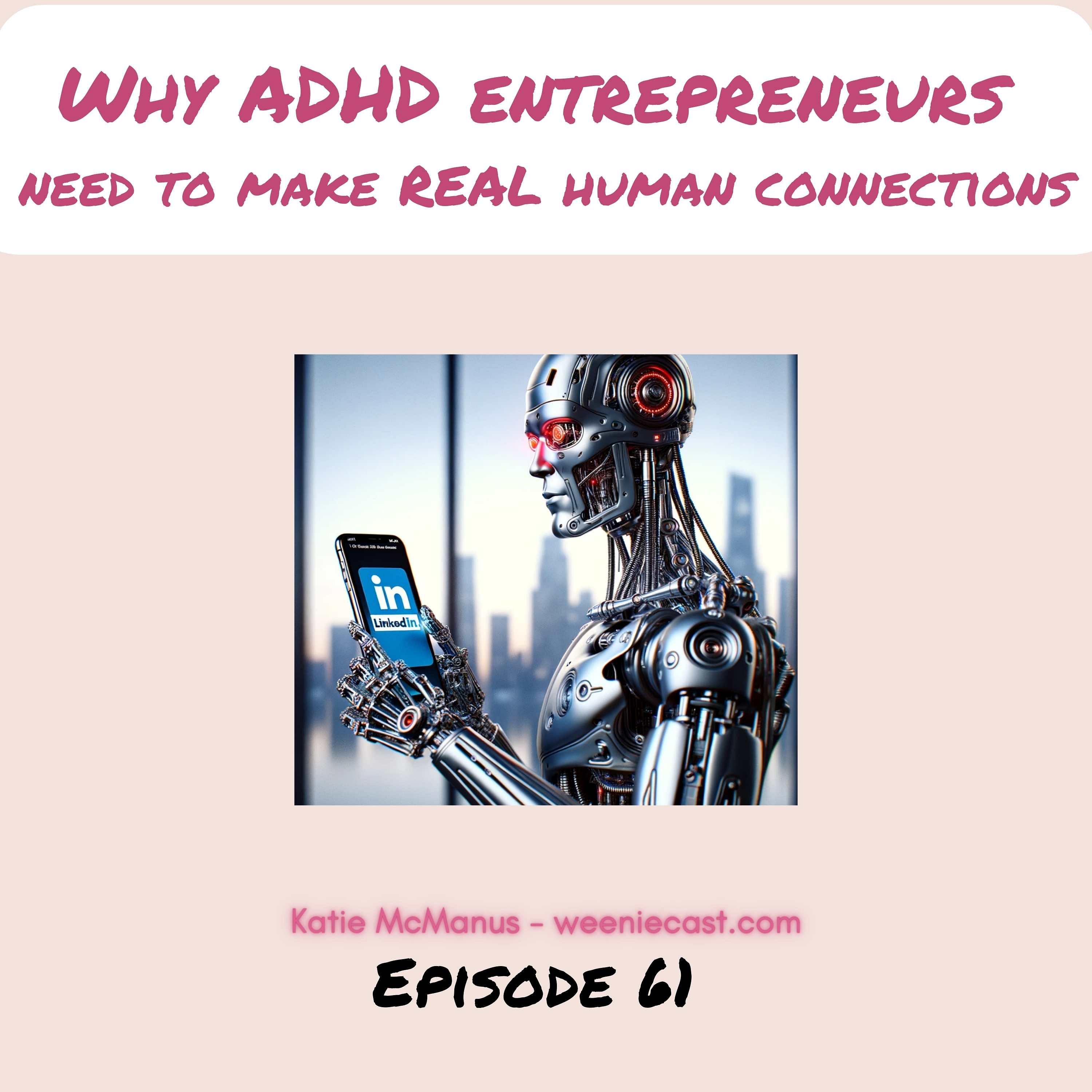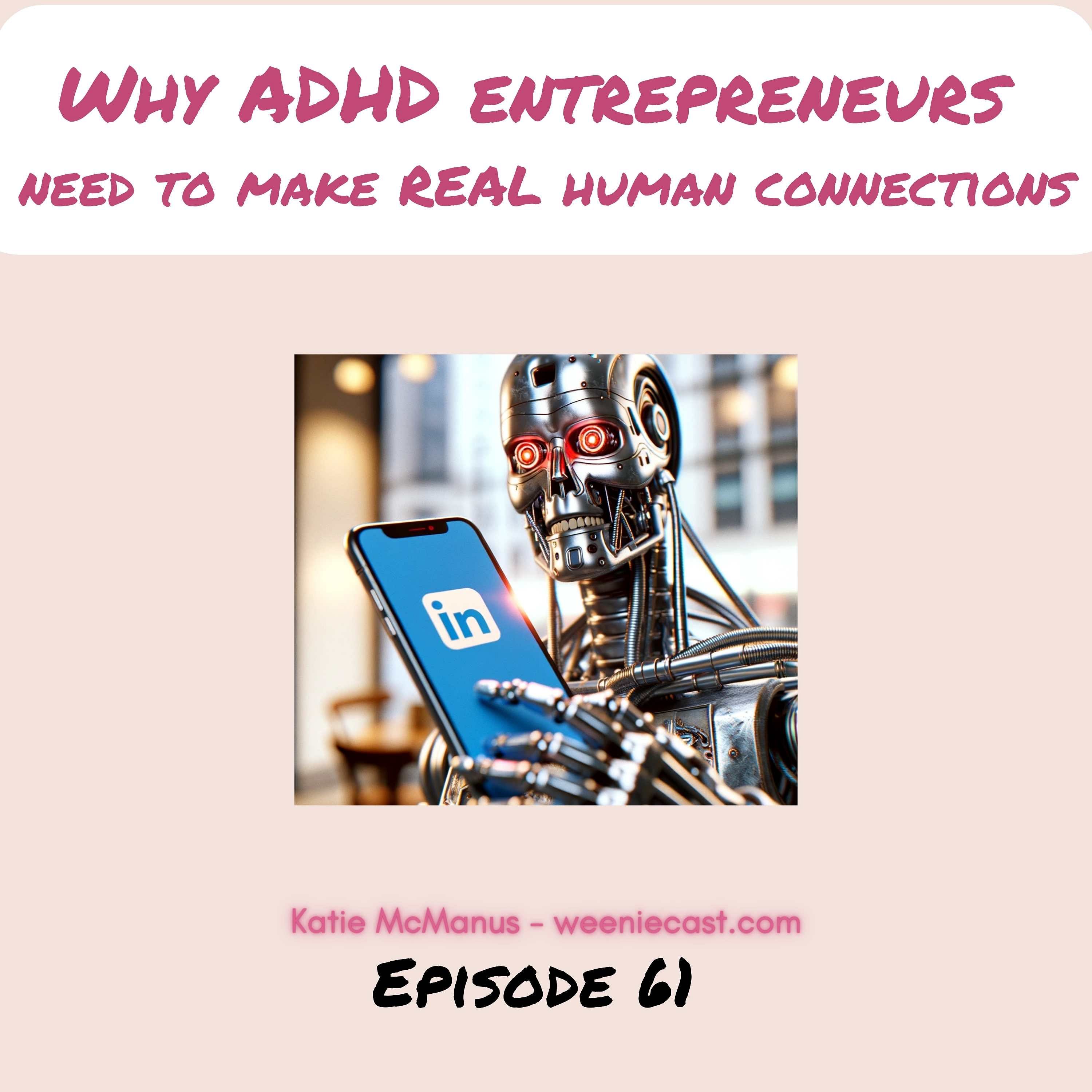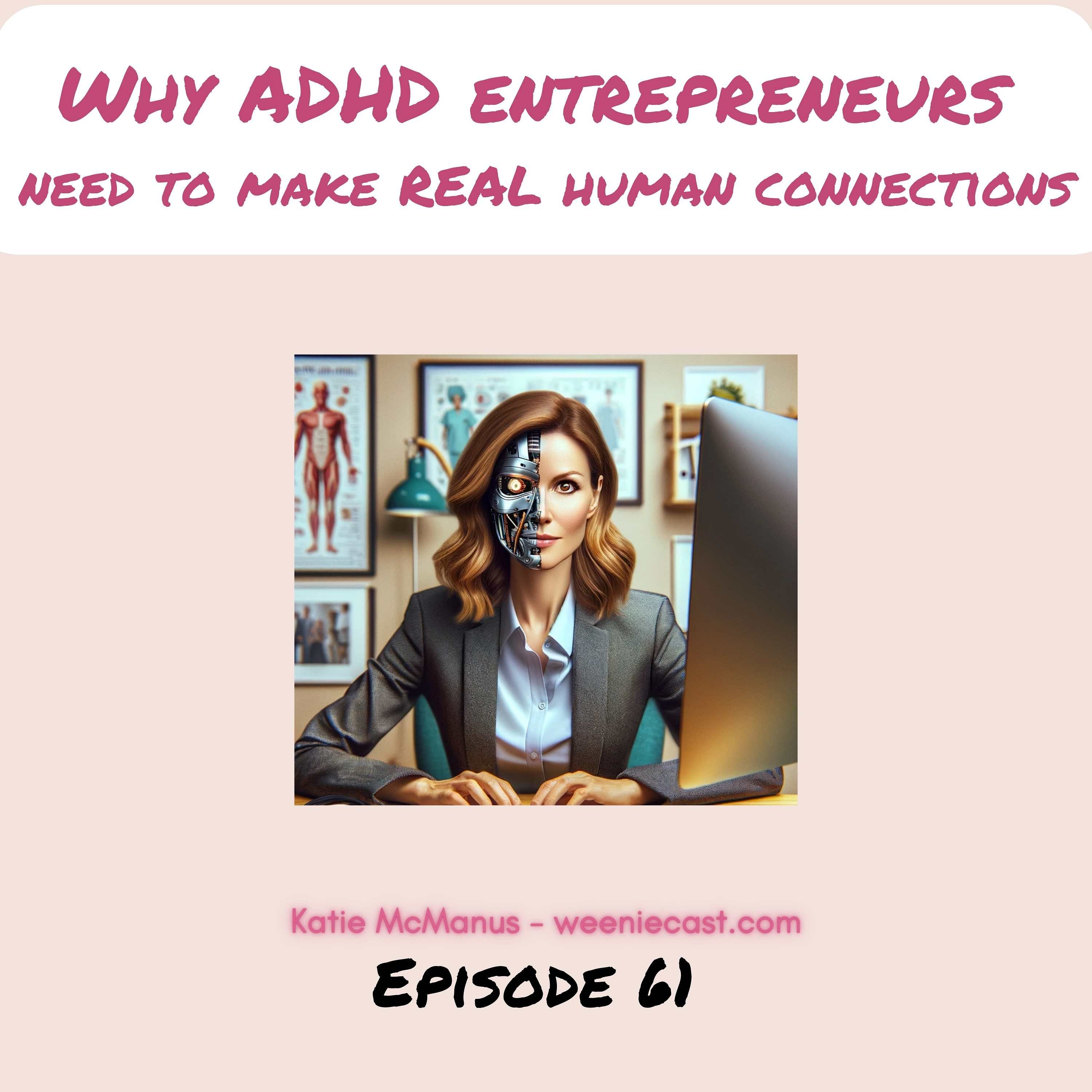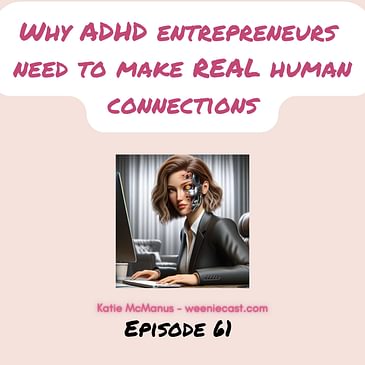The Right Way to Build real human connections in Your ADHD Business
Hey there! So, I had this incredibly vivid nightmare recently, and it got me thinking about a really important aspect of business strategy that I wanted to share with you.
It all revolves around my high school experience and a very unexpected speaker at our graduation ceremony.
Stay with me as I breakdown the significance of making real human connections in your business and how it can impact your success as an ADHD entrepreneur.
Seriously, if you're about to sit down at your Google machine and put together some content you'll churn out from ChatGPT, please STOP!
Listen to this episode first, will ya?
I'm not saying you shouldn't use AI in your business.
I'm saying you need to use AI in the RIGHT way for your business.
I'm Katie McManus, ADHD entrepreneur business strategist and money mindset coach. And this is The Weeniecast!
The Impact of Building Genuine Connections
Let me tell you about my high school graduation speaker.
It wasn't a local politician or a prominent business owner; it was our school janitor.
Yep, you read that right.
And the reason behind our class's selection is what sets the foundation for the discussion.
There's a real lesson in connections building to be learned here, my lovely weenie, and it's showcasing the power of authentic human connection in business!

The Limitations of AI in Building Connections
In the content creation universe, there's a prevalent myth about giving value.
We're often bombarded with recommendations to offer tips, impart knowledge, and teach – but is that all there is to value?
I argue that true value extends to cultivating a feeling of connection, trust, and understanding.
It's about going beyond mere information and establishing a meaningful bond with your audience.
Intrigued to dive deeper into the multifaceted nature of value in content creation?
Give the episode a listen right now in your favorite podcast app:
The Essence of Empathetic Marketing:
Let's delve into the concept of empathetic marketing. .

Traditional marketing advice often emphasizes delivering value and sharing expertise.
But in reality, empathetic marketing goes beyond that – it's about deeply understanding your ideal client's struggles and stresses.
It's about showing that you've been in similar shoes, which creates a sense of trust and relatability.
Got something to say about my take on AI in content creation? Let me have it!
Powered By Podcastpage.io
Redefining Value in Content Creation:
In the content creation universe, there's a prevalent myth about giving value.
We're often bombarded with recommendations to offer tips, impart knowledge, and teach – but is that all there is to value?
I argue that true value extends to cultivating a feeling of connection, trust, and understanding.
It's about going beyond mere information and establishing a meaningful bond with your audience. Intrigued to dive deeper into the multifaceted nature of value in content creation?
The episode's timestamps
00:00 School janitor chosen to speak at graduation.
03:23 Unseen caring makes lasting impact on teenagers.
07:51 Mother and daughter bond over fish feeding.
12:43 First old man's advice deemed worthless.
15:48 Connect genuinely with audience for successful content.
17:15 Authenticity matters, embrace your true self.

Your next steps after listening
Wanna get this content earlier, and unbleeped? Listen to the Apple Podcasts premium version of this show - https://weeniecast.com/winners
Book a strategy call with me - weeniecast.com/strategycall
Get more support in your ADHD entrepreneur life by joining my hyperfocus community! - https://weeniecast.com/hyperfocus
Want to just buy me a coffee in return for some helpful insight? Thank you! Here's where you can do that - https://www.buymeacoffee.com/katiethecoach
Speaker:
In this episode, you'll learn what my high school janitor can
Speaker:
teach you about attracting your ideal client.
Speaker:
Hi, I'm Katie McManus, business strategist and money mindset
Speaker:
coach. And welcome to the Weeniecast,
Speaker:
I have the most
Speaker:
traumatizing recurring nightmare. In this nightmare, I get a phone
Speaker:
call from my old guidance counselor from my high school, Mr.
Speaker:
Bennett. And Bennett says, hey, Kathryn, so great to talk to
Speaker:
you. I'm sorry, but I have some bad news. And I'm like, what,
Speaker:
Mr. Bennett? Like, what happened? I'm thinking, like, someone died or
Speaker:
the school burned down, whatever. And he know. We've
Speaker:
actually been auditing our past records, and it looks
Speaker:
like the courses you did in your senior year of high school
Speaker:
actually weren't enough for you to graduate. And unfortunately, we have
Speaker:
to take your high school diploma back. And if you'd like to keep
Speaker:
it, you'll just have to redo your senior year of high school, and you'll
Speaker:
have to come back and enroll. And in my dream, I'm very aware that I'm
Speaker:
in my 30s. There are a few ways this dream goes from there. Sometimes I
Speaker:
go back to school. Sometimes I say, fuck it, I'm just not going to have
Speaker:
a diploma. There's a lot of different ways that Dreamcatie handles
Speaker:
this nightmare. And the only reason I bring this up
Speaker:
is because I'm talking about this incredible thing that happened
Speaker:
at my high school graduation that helps me prove a point
Speaker:
about what you should be using to create content that will
Speaker:
attract your ideal clients. Before we get to that,
Speaker:
I want to share. At my high school, the senior class would always
Speaker:
vote on who their main speaker would be at
Speaker:
graduation. This was usually a local
Speaker:
politician, a celebrated business owner, maybe one of the
Speaker:
favorite teachers, maybe an administrator
Speaker:
know had been influential in some big project during their
Speaker:
time at school. My class, however, chose our
Speaker:
school janitor. I believe his name was Dave. And I'm so
Speaker:
embarrassed. I'm really bad with names from that far back. The reason
Speaker:
my class chose the school janitor to
Speaker:
speak at our graduation was because he was the
Speaker:
adult in that building who made
Speaker:
the most people in our class feel seen and
Speaker:
understood and taken care of. He was there in the
Speaker:
hallways when someone got kicked out of class for misbehaving,
Speaker:
and they were just having a really bad day and they needed to talk to
Speaker:
someone. I seem to remember him putting his mop up against the
Speaker:
wall and just kind of walking with them down the hallway for a bit and
Speaker:
just being an ear. After school, if kids
Speaker:
were sitting around and kind of avoiding going home,
Speaker:
he'd be the first person to ask, like, hey, what's going on? If you made
Speaker:
an excuse to go to the bathroom in the middle of class because you needed
Speaker:
to go cry, he was usually in the hallway. He was usually
Speaker:
just a very kind person to speak to. He offered genuine
Speaker:
connection, and it wasn't that
Speaker:
structured connection that you got. If you went to the guidance counselor's
Speaker:
office and set up an appointment and then had a meeting with
Speaker:
Mr. Bennett and all the things, and they put the notes in your
Speaker:
file that you were having a hard time with this, that and the other thing.
Speaker:
He was just an adult who cared. He gave a. When he
Speaker:
got up to speak, he was incredibly touched that he was
Speaker:
being recognized in this way. And
Speaker:
I don't think he realized until that moment what a
Speaker:
difference he made in so many teenagers lives.
Speaker:
Simply by being there, simply by listening, simply by
Speaker:
giving a fucking caring. It's really something special
Speaker:
to be able to do that for kids that have
Speaker:
adults around them that might not be listening. And I'm sure as I'm
Speaker:
describing this person, you're listening, thinking about
Speaker:
this person that was there for you when you were younger, that
Speaker:
adult who was just kind of always there in the periphery, who, if you needed
Speaker:
to talk to them or if you were crying, they would ask you, what's going
Speaker:
on? You okay? We remember these people.
Speaker:
These people have a very special place in our hearts,
Speaker:
even if we can't remember their names 20 years later. I say
Speaker:
all this to prove a point, that chat GPT is
Speaker:
shit.
Speaker:
As you're growing your business, I know a major part
Speaker:
of promoting your work and marketing yourself and being on social media
Speaker:
is coming up with a crap ton of content.
Speaker:
And it's so easy now that we have this incredible
Speaker:
robot brain to turn to, to go
Speaker:
and give them a couple prompts and get some language
Speaker:
back and say, amazing. This is content that I'm going
Speaker:
to share on social media that's going to convince people that they need to hire
Speaker:
me. Guess what? Chat GPT can't build
Speaker:
connections. Chat GPT can't make people feel
Speaker:
seen or heard. Chat GPT can't make
Speaker:
people laugh in a genuine way. It can't
Speaker:
represent your personality, the way you
Speaker:
show your personality. It's great for coming up with content
Speaker:
ideas, but I don't want you becoming
Speaker:
reliant on using chat GPT content to
Speaker:
promote your business, because guess what? It
Speaker:
won't work as well in my
Speaker:
programs. Whether you work with me in my group program or one on
Speaker:
one. The type of marketing that I teach is called empathetic
Speaker:
marketing. And this style of marketing does a couple different
Speaker:
things. It really communicates that you understand
Speaker:
the troubles, the stresses, the fears that your ideal
Speaker:
clients have. You exhibit that you deeply understand where they want to
Speaker:
go from here. What does winning look like to them? And
Speaker:
a lot of that is listening to them. And a lot of that
Speaker:
is also sharing your personal stories, showing
Speaker:
that you've been in their shoes, you've struggled with
Speaker:
similar things, and you've overcome
Speaker:
similar things. And by the way, if
Speaker:
they're ready to overcome them, you're happy to be there to help them. In
Speaker:
the content creation universe, there is this myth of giving
Speaker:
value. All the social media gurus are out there saying, give
Speaker:
value, give helpful tips, give listicles of things that people
Speaker:
should do to move from X to Z, and blah,
Speaker:
blah, blah, blah, blah. Yes, you can absolutely give
Speaker:
tips. You can exhibit how smart you are. You
Speaker:
can teach. But I want to remind you, my senior
Speaker:
class did not nominate a single teacher to speak. They
Speaker:
nominated the person who is listening, who built those connections with
Speaker:
them. Your ideal clients out there who are paying attention to
Speaker:
your content are waiting for you to build that
Speaker:
connection. They have enough people who are throwing information at them, who
Speaker:
are trying to teach them shit that's like, in that moment, they're not ready to
Speaker:
accept. And to prove this point,
Speaker:
I'm going to tell you. Oh, what am I going to say next? Well, you'll
Speaker:
have to keep listening to find out. But first, squirrel, squirrel, squirrel,
Speaker:
squirrel.
Speaker:
And to prove this point, I'm going to tell you the story of the two
Speaker:
old men in the park. I've told this story previously, but it really shows
Speaker:
you what works in marketing. Every single day,
Speaker:
there is a young mom, and she has a three year old daughter. And they
Speaker:
go to the park, and this little girl is obsessed with the
Speaker:
fishes in the pond. She insists
Speaker:
that every single day, rain or shine, they have to take some pieces of
Speaker:
bread to go and feed the fish. And she checks on them, and she kind
Speaker:
of names them, and she gets really excited when they come up
Speaker:
to the surface and they bite the bread and all the things. And she really
Speaker:
takes her time to spend time with her fish, right? And the mom,
Speaker:
of course, any excuse to get out of the house and give her child
Speaker:
an activity that she doesn't have to really be the entertainer for
Speaker:
is a nice little break. And so every single day, around the
Speaker:
same time, they go to the pond, the daughter feeds the fish, and the mom
Speaker:
just kind of hangs back, watches, and occasionally she'll
Speaker:
notice that around the same time every day, there are two old men that sit
Speaker:
on either side of this little pond. One day, after they've been doing
Speaker:
this for a long time, she realizes, like, this is so silly. I should just
Speaker:
go and introduce myself. So she goes up to the first old man
Speaker:
and tells him her name and says, hi, I see you here a lot.
Speaker:
Thought it was just time that I introduced myself. And he says, oh, it's so
Speaker:
nice of you to do that. Yes, my name is so and so. Please have
Speaker:
a seat on the bench. How's your day going? She says, oh, it's going really
Speaker:
well. And he starts talking, and he starts saying,
Speaker:
I saw your daughter having a temper tantrum last week. And here's what I would
Speaker:
have done differently. Here's, like, the three step process that I would have taken to
Speaker:
handle a child having a temper tantrum. And also,
Speaker:
do you ever have a squeaky wheel on your office chair?
Speaker:
Here's how you fix it. Also, if your door hinge is
Speaker:
ever out of alignment, here's what you do with a hammer to
Speaker:
just tap it back into place. And if you ever have
Speaker:
a leaky faucet in your house, here's how you'd fix it from a plumbing perspective.
Speaker:
But if you don't have those tools and you're a little nervous about
Speaker:
doing plumbing work and you're waiting for an actual plumber, what you can do is
Speaker:
you can tie a string around the tip of the faucet, and instead
Speaker:
of the water doing the drip, drip, drip, that drives you crazy, the water will
Speaker:
just fall down that string to the bottom of the sink. And he goes on,
Speaker:
and he's sharing fairly helpful tips with her throughout the time
Speaker:
that they're sitting on this bench together. And then, of course, it's time to go.
Speaker:
The bread is done, and the little girl has lost interest in the fish for
Speaker:
the day. And the woman says, it's been so nice to talk to you.
Speaker:
I will see you tomorrow. And they say goodbye. The next
Speaker:
day, the woman comes back to the pond, and instead of
Speaker:
talking to the first old man, she decides she wants to say hi to the
Speaker:
second old man, who's also there every day. And so she goes, and again, she
Speaker:
introduces herself and explains that she sees him there all the time and
Speaker:
thought it was time that she introduced herself. And he says, oh, my God. It's
Speaker:
so nice to meet you. My name is so and so. Please come and sit
Speaker:
down. And he asks her how's your day going? And he
Speaker:
says, I saw your daughter have that temper tantrum last week,
Speaker:
and I just want to say you did a great job. I know having kids
Speaker:
at that age is so tough. I had three of them,
Speaker:
and the oldest one used to do this and it drove me crazy. And
Speaker:
then the middle one would go off on these tears and,
Speaker:
oh, my God, I thought my wife was going to burn the house down.
Speaker:
And our youngEst, oh, our youngest,
Speaker:
we are so delighted that our youngest has children now. So they get
Speaker:
their comeuppance, right?
Speaker:
They have kids, and their kids are around your daughter's age,
Speaker:
and you know what they call us? They're at their wits end sometimes. And
Speaker:
being a parent is so hard, isn't it? But it's so gratifying. And then
Speaker:
he goes on to ask her questions about her life and about what's
Speaker:
going on for her, and then he shares stories about himself.
Speaker:
And throughout this time, she feels really
Speaker:
connected to him. She feels seen, she feels acknowledged.
Speaker:
She doesn't feel at all shamed for how he's observed her
Speaker:
parenting her daughter. And then, of course, the
Speaker:
daughter runs out of bread, loses interest, it's time to
Speaker:
go. The next day, who is she going back to?
Speaker:
The first old man or the second old man?
Speaker:
And this is a rhetorical question, but there is a right answer, and it's the
Speaker:
second. Second one. Of course, not only that, but
Speaker:
if she ever has a parenting
Speaker:
question, if she ever wants feedback from someone who's
Speaker:
been there, she's not asking the first old man who gave a ton of quote
Speaker:
unquote value. She's going to the second old man
Speaker:
who normalized the struggle, who didn't
Speaker:
give her any suggestions how to do it better, just
Speaker:
acknowledged that it's hard, and shared that he had a
Speaker:
lot of experience with it, didn't try to fix her problems,
Speaker:
and made her feel seen and listened to.
Speaker:
When we're thinking about value, we oftentimes
Speaker:
think of, well, what's the lesson that they're going to take away? What is
Speaker:
the actual curriculum that they're going to walk away with that is
Speaker:
going to show them how to get from point A to point B?
Speaker:
But that's not all value is. Value
Speaker:
is also a feeling. Value is that
Speaker:
connection that trust you build.
Speaker:
I would actually argue that the value the first old man
Speaker:
gave was pretty worthless.
Speaker:
It was all stuff that if she actually had that problem, she could go onto
Speaker:
the interwebs, Google, search it and find the
Speaker:
answer. It was all stuff that I'm sure a
Speaker:
million first old men have created YouTube videos
Speaker:
about, but she can't get what she got from the
Speaker:
second old man from a Google search. And neither can your
Speaker:
clients. As you're thinking about what kind of
Speaker:
content to create, I know it's really
Speaker:
tempting to turn to tools like chat GPT, because
Speaker:
that's what everyone's telling you to do, and it seems so easy. And
Speaker:
as ADHD entrepreneurs, we're always looking for different
Speaker:
ways to hack things and make it easier for ourselves.
Speaker:
But it's not going to be as effective as actually just connecting with
Speaker:
your ideal clients and showing that you understand
Speaker:
where they are. There's this funny thing that happens with new
Speaker:
business owners in particular, and especially people who have ADHD,
Speaker:
is that when you start a business, you feel like you have to prove to
Speaker:
the world that you know what you're talking about, that you're an expert,
Speaker:
that you are a
Speaker:
quantifiable authority in your
Speaker:
industry. It's almost like you feel like you have to make a list
Speaker:
of all the things that you know and present this list to everyone so that
Speaker:
they can see that you know, stuff. Because we're so self conscious that people
Speaker:
are going to think that we're dumb or we're doing it wrong or that we're
Speaker:
not qualified for the thing. And this can come from a myriad of things.
Speaker:
This can come from having massive shiny object syndrome, right where
Speaker:
you're jumping from topic to topic. So you become a very
Speaker:
spread out generalist. You're not necessarily an expert in
Speaker:
one particular area. It can also come from people
Speaker:
just treating you like you're not good enough. And it
Speaker:
doesn't necessarily even have to be true. It could be rejection, sensitivity,
Speaker:
dysphoria, where you're just perceiving the tone that they're
Speaker:
speaking to you in as they're thinking that you're not good enough or you're
Speaker:
not smart enough or you're not qualified enough. It's that
Speaker:
self rejection that you do to yourself that makes you feel like you
Speaker:
have to prove to the world that you are smart and capable.
Speaker:
The interesting thing about humans is we actually don't go
Speaker:
around assuming everyone else is stupid. We actually go around
Speaker:
assuming that everyone else is just as smart as we are until
Speaker:
proven otherwise. So unless you hang around with
Speaker:
really, really dumb people who are very aware that they're
Speaker:
dumb, you do not have to prove anything.
Speaker:
What you do have to do is you have to build connection with your
Speaker:
ideal clients. That is the thing that is going to make you the most memorable.
Speaker:
That is the thing that is going to create a special
Speaker:
part in their hearts for you because you understood them
Speaker:
more than anyone else, especially if you're selling a high level
Speaker:
service that costs a lot of money. I want you to think about the people
Speaker:
who are out there in the world, who are following your content, who
Speaker:
are reading it every single day and reading other people's
Speaker:
content that's giving a ton of value. If they're going to spend
Speaker:
a ton of money on solving this problem that you
Speaker:
fix, are they likely to hire the person
Speaker:
who's offering advice they can find on Google? Or are they
Speaker:
likely to hire the person who they feel deeply connected
Speaker:
to, who they trust more than anyone,
Speaker:
and who they know will not shame
Speaker:
them for being in this problem?
Speaker:
Bet you it's the latter.
Speaker:
This doesn't just go for creating content, it also goes for
Speaker:
engaging on other people's content.
Speaker:
I want to urge you not to use chat,
Speaker:
GPT or other AI
Speaker:
tools to comment on other people's posts.
Speaker:
It's obvious I have started deleting comments
Speaker:
that are obviously written by a robot because I'm not
Speaker:
online to connect with robots. If I'm having a conversation
Speaker:
with you in my comment section, I'm having a conversation with you.
Speaker:
I don't want to have a conversation with a robot. If I did, I'd be
Speaker:
spending a lot more time on chat GPT and I'd be getting a little weird.
Speaker:
We both know that. Not that I'm not already weird. I know using
Speaker:
chat GPT comes from a place of fear and worry,
Speaker:
that what you have to say is not good enough, that being you is
Speaker:
not good enough. But I promise you you
Speaker:
are. I promise you that it doesn't matter how
Speaker:
you show up. There are going to be people
Speaker:
who, when you show up as your authentic self, will be drawn
Speaker:
to you. You can make all the spelling mistakes,
Speaker:
the grammatical mistakes that you want, and it really doesn't matter.
Speaker:
And please, for the love of God, do not use chat GBT to comment on
Speaker:
my posts. Squirrel, squirrel, if you're ready to stop being a weenie and
Speaker:
actually run a business that makes money, then go ahead and book a
Speaker:
generate income strategy call with me by going to
Speaker:
Weeniecast.com strategycall.
Speaker:
On this call we will talk about your goals, your dreams,
Speaker:
and your frustrations in getting there. And if it's a fit
Speaker:
for both of us, then we can talk about different ways to work together.
Speaker:
Wow,
Speaker:
it's just like there's so many comments where they're just summarizing my post and
Speaker:
I'm like, Are you kidding me? Squirrel,
Speaker:
squirrel, squirrel, squirrel.


